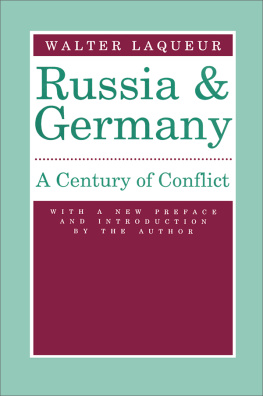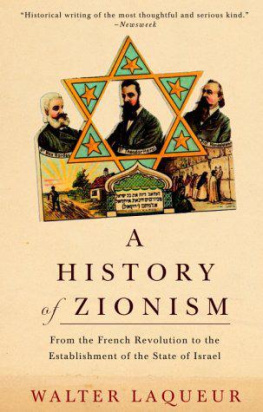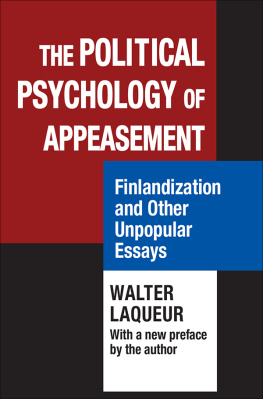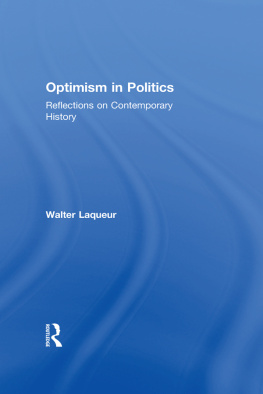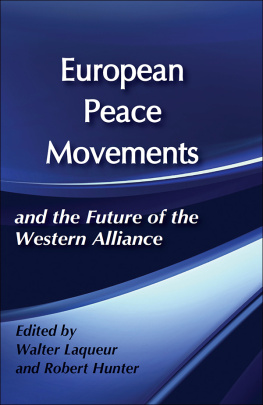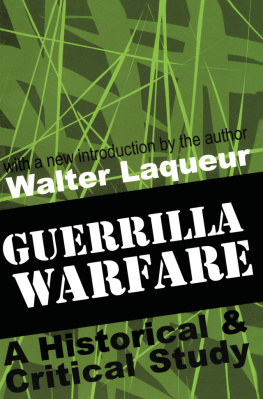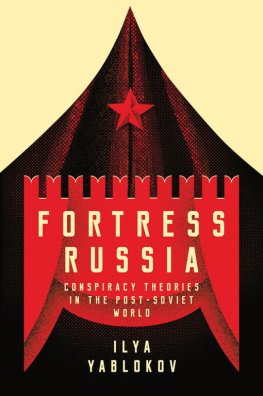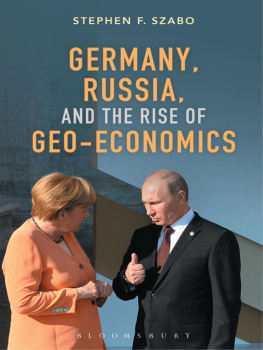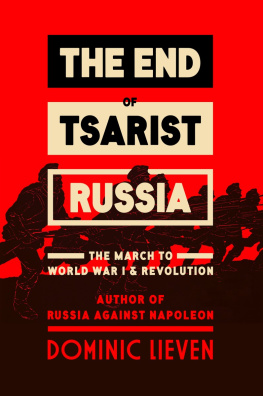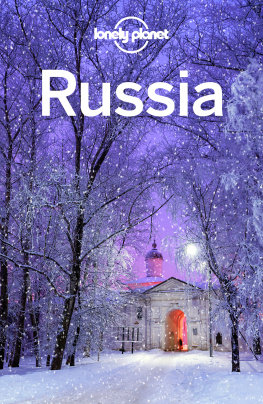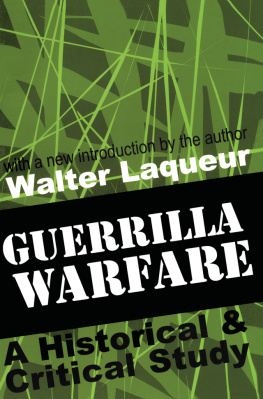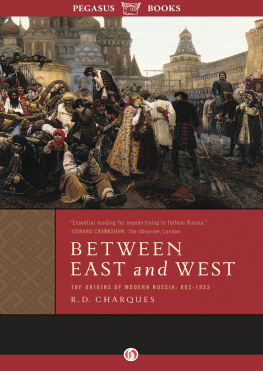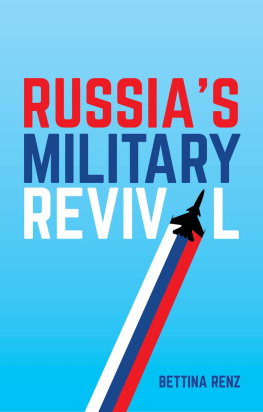Originally published in 1965 by Little, Brown and Company
Published 1990 by Transaction Publishers
Published 2017 by Routledge
2 Park Square, Milton Park, Abingdon, Oxon OX14 4RN
711 Third Avenue, New York, NY 10017, USA
Routledge is an imprint of the Taylor & Francis Group, an informa business
New material this edition copyright 1990 by Taylor & Francis
Copyright 1965 by Walter Laqueur
All rights reserved. No part of this book may be reprinted or reproduced or utilised in any form or by any electronic, mechanical, or other means, now known or hereafter invented, including photocopying and recording, or in any information storage or retrieval system, without permission in writing from the publishers.
Notice:
Product or corporate names may be trademarks or registered trademarks, and are used only for identification and explanation without intent to infringe.
Library of Congress Catalog Number: 89-20685
Library of Congress Cataloging-in-Publication Data
Laqueur, Walter, 1921
Russia and Germany / by Walter Laqueur ; with a new introduction by the author.
p. cm.
Reprint. Originally published: Boston : Little, Brown, 1965.
ISBN 0-88738-349-1
1. Soviet UnionForeign public opinion, German. 2. Germany
Foreign public opinion, Russian. 3. National socialism.
4. Communism-Soviet Union. I. Title.
DK67.5.G3L3 1990
943.08dc20
89-20685
CIP
ISBN 13: 978-0-88738-349-6 (pbk)
WHEN I BEGAN working on this book the Berlin wall had just been erected; as I write this new introduction, almost three decades later, it is pulled down to the jubilation of millions of people in East and Westone of the great victories of the idea of freedom in our century. As the reunification of Germany appears again on the international agenda, as the cold war seems to draw to a close, as Soviet relations with Germany and with Western Europe in general have entered a new stage, there is for the first time in many decades much reason for optimism after so many years of strife and conflict. It is the duty of the historian to recall that important events usually do not happen overnight and that the way ahead to a lasting reconciliation and to real peace in Europe may be long and strewn with pitfalls. A giant step forward has been made but the common European home invoked by Mr. Gorbachev and others can at best vaguely be discerned in the distance. In any case, the relationship between Russia and Germany continues to be the most important single issue not only in European politics but in East-West affairs; thus the subject of the present book is perhaps of even greater topical significance now than when it was first published.
Russia and Germany is a study of what Russians and Germans thought of each other and of the fateful consequences of their interacting ideas. It is neither a study of diplomatic nor of military historyimportant monographs covering these and other aspects have been published both before and after my book first appeared. But there has been, to the best of my knowledge, no comprehensive attempt to deal with the issues I addressed a quarter of a century ago. Russia and Germany has frequently been quoted, most recently by Russian writers rediscovering the problem of National Bolshevism in their country. But it has been out of print for a long time and I therefore welcome the opportunity to introduce it to a new generation of readers.
It goes without saying that the international constellation has greatly changed over the last quarter of the century. In 1965 there were still grave suspicions in Moscow with regard to German revanchism, and West Germany felt threatened by aggressive Soviet designs. In 1989, on the other hand, Mr. Gorbachev was received with enthusiastic acclaim in Bonn like no other foreign statesman. Talk about a German problem in 1990 more often than not refers to certain doubts in Western capitals about the steadfastness of Germany as a NATO ally or the prospects of German unification, rather than the traditional enmity between Teutons and Slavs. In the Soviet Union too, fears of West German aggressive designs have virtually disappeared. If Soviet-German relations are still (or again) a matter of great interest and importance, this has nothing to do with the old conflict between the two states but focuses, on the contrary, on issues such as the future of East Germany and the question of how far collaboration between the Soviet Union and Germany will go in future. But there are yet other issues of common concern to the two countries. I found to my surprise that in the very first sentence of this book I referred to the fateful consequences of their interacting ideas and in the second sentence I mentioned Russophobia at a time when this was not a household word, as it is now in the Soviet Union.
Germany and the Soviet Union have been in this century the scenes of the most inhuman cruelty, and it was clear even in 1965 that this heritage would preoccupy Germans and Russians for a long time to come. In Germany, Nazism was destroyed as the result of total defeat in war. But Stalinism in the Soviet Union emerged triumphant in 1945, and de-Stalinization has been a very slow and therefore very painful process. I wrote at the very end of my book that it will take a long time to forget Stalin and a much longer time to get away from Hitler. This prediction has proved wrong at least in the short run. Germany in 1990 is in most respects a normal country; the democratic system has taken roots, there is an extreme right wing as there is in virtually all other countries, but it would be incorrect to equate it with the Hitler movement. Whether this new, democratic system will withstand a serious crisis we do not know; it has been fortunate enough to be spared one so far, and there is no reason to anticipate the worst.
In the Soviet Union, on the other hand, the process of de-Stalinization, albeit slow and limited under Khrushchev, was stopped and in many respects reversed under Brezhnev. Even some of those who had been rehabilitated after the Twentieth Party Congress (1956) became again enemies of the people or at the very least unpersons. Only under glasnost was the subject of Stalin and Stalinism more or less freely discussed. And it soon became clear that the sources of Stalinism went deeper than often believed. It was not so much the question of one man, his motives, and the consequences of his actions. The real problem was, of course, why Stalin had been able to model Soviet society in his image, and how this baneful heritage could be liquidated.
It was relatively easy to change the political leadership, but to eradicate the Stalin mentality something akin to a cultural revolution was needed, and such revolutions are not frequent in the annals of historyif successful, they extend over many years. For this reason I wrote in 1965 that the political problem (of de-Stalinization) is more difficult in Russia than in Germany because there had been no radical break with the past, but psychologically it should be much easier in the end for the Soviet people, for they themselves, not foreigners, were the main victims. It is too early to say whether the second part of this prediction will be borne out by events. For there was a substantial stratum in Soviet society that supported Stalinism for a variety of reasons, which either denied that there were victims or maintained that the sacrifices were unavoidable. And even after Stalins death there have been not a few claiming that everything, or almost everything, was better under the late tyrant: law and order, the supply of sausages, discipline and idealism among the youth, and so forth.

